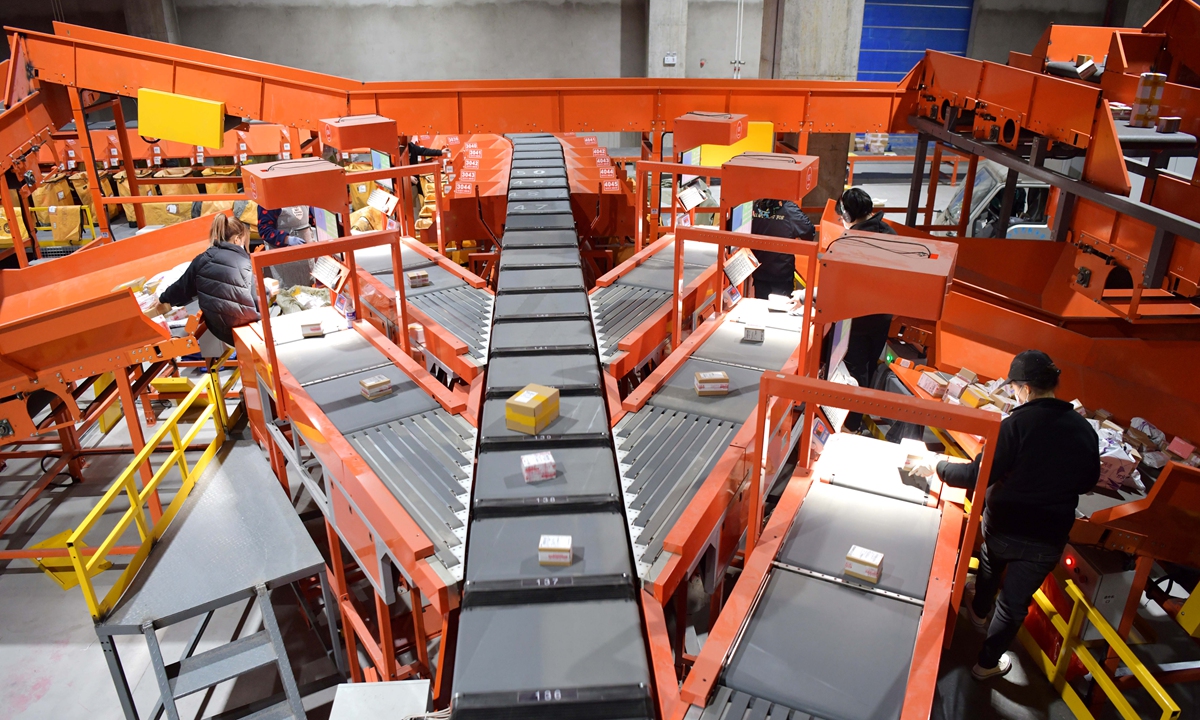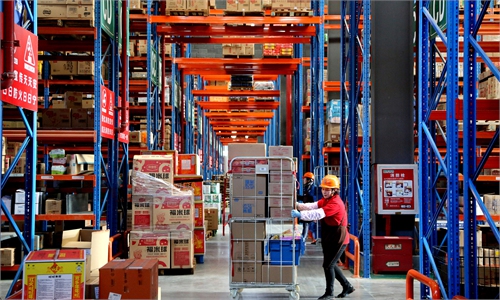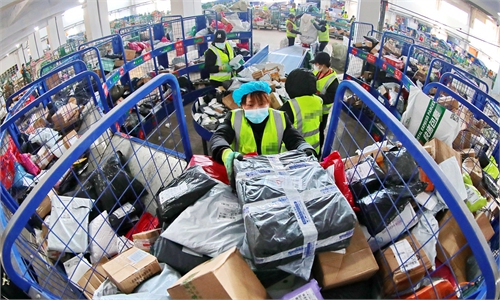China’s Double 12 sales event hits the brakes, as firms eye upcoming shopping season
Online sales event turns low-key, as firms eye upcoming shopping season

Workers sort parcels at night in an e-commerce industrial park in Lianyungang, East China's Jiangsu Province on November 2. Photo: cnsphoto
China's Double 12 shopping festival, the country's year-end shopping bonanza that follows the Double 11 festival, raised the curtains on Sunday, yet this year's event is shorn of boasting and aggressive marketing campaigns by major e-commerce platforms amid tightened scrutiny over internet industry.
The subdued version of the Double 12 shopping event is partly a result of both consumers' and merchants' pre-spending during Singles' Day, the world's largest shopping carnival, which saw sales hit a record high this year, and it also comes as companies ranging from e-commerce sites to livestream platforms launch promotions throughout the year that divert consumers' attention, industry insiders said.
But such a turnaround does not equate to dwindling Chinese consumption power, analysts said. Chinese consumers' excitement remains, with demand shifting toward more high-quality and personalized items, and that will continue to serve as a ballast underpinning the growth of the world's second-largest economy.
Competition among e-commerce platforms is largely absent in the Double 12 shopping festival this year, with much reduced promotional activity and a shorter sales period. Also, many e-commerce platforms did not release sales figures.
A spokesperson for Suning told the Global Times on Sunday that promotions at the e-commerce platform this year are more targeted to satisfy different tastes, while consumption so far has shown a trend of high-end and greener purchases.
For example, sales of home appliances priced above 6,000 yuan ($942) have expanded 79 percent year-on-year to date, and the sales of high-end beds are up 108 percent.
Chinese e-commerce platform Tmall told the Global Times that it would launch several promotions during the Double 12 shopping festival. One representative move will be a sale of 19,800 bottles of Kweichow Moutai, China's top high-end baijiu, which is scheduled to begin at 8 pm on Sunday.
"We often say this year's Double 11 shopping festival opened in a low-profile manner, but it seems like the Double 12 is of little interest as well," Liu Dingding, a Beijing-based independent tech analyst, told the Global Times on Sunday.
A manager of a US-listed Chinese e-commerce platform, who spoke on condition of anonymity, told the Global Times that the reason why it avoided this year's Double 12 shopping festival is that the company "mobilized major resources" during the Double 11 sales, which achieved record numbers.
"The coming January is another sales bonanza, as more Chinese will choose to stay at their working places to spend the Spring Festival holidays amid a resurgence of coronavirus cases. As demand will explode at that time, we decided to hit the brakes in December and then run in full swing next month," the manager explained, noting the company has strong confidence in the Chinese consumers' spending power.
Such a philosophy is widely shared among Chinese consumers, some of whom used up their budgets ahead of December. "Also, the discounts are not large enough to 'lure' me into spending again," a Beijing-based white-collar worker surnamed Wang told the Global Times.
Analysts stressed that a slip in the event's public attention does not signal a retreat in either Chinese consumption power or a freeze of the e-commerce industry.
"This is an expected development as the internet economy this year entered a phase of adjustments. Although the growth rate may slow down, demand is still very robust and offers sheer size, and e-commerce platforms will pursue quality and innovative development to satisfy demand from market segments," Liu said, rejecting some Western media claims that lukewarm consumption could be a "stigma" on the Chinese economy.
Livestreaming remains a hot spot of the Double 12 shopping festival. Ahead of the event, Chinese livestreaming top stars, including Li Jiaqi announced a list of items - from snacks, food and clothes to cosmetic products - that will be sold via livestreaming. The list soon jumped to the hot search ranks of China's social media platform Sina Weibo.
During this year's annual Double 11 shopping festival, Chinese shoppers spend $139.1 billion, breaking last year's record despite the impact of the coronavirus epidemic.



